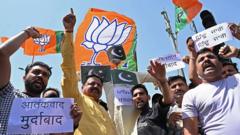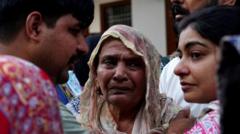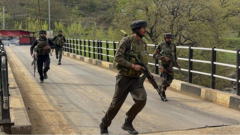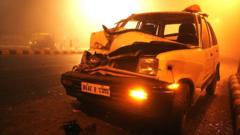The tragic shooting of civilians in Kashmir, which resulted in at least 26 fatalities, exposes the fragility of the situation in a region long-touted by India as being under control. Officials are now facing scrutiny regarding security measures in the highly militarized area, and there are rising fears of escalating tensions with Pakistan. Prominent military figures and analysts suggest the incident serves to challenge the narrative of peace.
Kashmir Attack Sparks Tensions and Questions India’s Claims of Peace

Kashmir Attack Sparks Tensions and Questions India’s Claims of Peace
A recent attack on tourists in Kashmir raises concerns over ongoing violence in the region despite Indian government's assertions of stability.
In a picturesque valley near Pahalgam, tourists were enjoying a peaceful day when militants launched an attack from nearby forests, killing many and injuring others. This incident comes as a stark reminder of the longstanding instability in Kashmir, which has been at the center of Indo-Pak tensions since the subcontinent's partition. Indian authorities place blame on Pakistan for supporting militancy, a claim that has persisted since the region's conflict began decades ago.
The BJP-led government's claims of curbing violence in Kashmir bear significant weight in the wake of this tragedy, with experts indicating that such acts of violence serve to undermine these narratives. D.S. Hooda, a retired Indian army general, remarked that the government now feels compelled to react decisively, raising fears that such a response could reignite military confrontations. With historical context, the attack is anticipated to increase the pressure on Prime Minister Modi’s administration and heighten the geopolitical stakes in the region.
The delicate balance of power in Kashmir continues to be a point of contention, making peace efforts complex as both India and Pakistan uphold claims to the territory, with serious implications for the civilians caught in the midst of this long-standing conflict.
The BJP-led government's claims of curbing violence in Kashmir bear significant weight in the wake of this tragedy, with experts indicating that such acts of violence serve to undermine these narratives. D.S. Hooda, a retired Indian army general, remarked that the government now feels compelled to react decisively, raising fears that such a response could reignite military confrontations. With historical context, the attack is anticipated to increase the pressure on Prime Minister Modi’s administration and heighten the geopolitical stakes in the region.
The delicate balance of power in Kashmir continues to be a point of contention, making peace efforts complex as both India and Pakistan uphold claims to the territory, with serious implications for the civilians caught in the midst of this long-standing conflict.





















